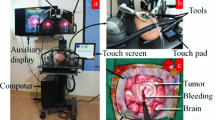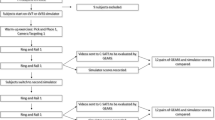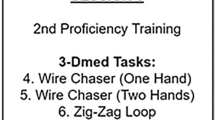Abstract
The objective of this study was to determine whether the GI Mentor II virtual reality simulator can distinguish the psychomotor skills of intermediately experienced endoscopists from those of novices, and do so with a high level of consistency and reliability. A total of five intermediate and nine novice endoscopists were evaluated using the EndoBubble abstract psychomotor task. Each subject performed three repetitions of the task. Performance and error data were recorded for each trial. The intermediate group performed better than the novice group in each trial. The differences were significant in trial 1 for balloons popped (P = .001), completion time (P = .04), and errors (P = .03). Trial 2 showed significance only for balloons popped (P = .002). Trial 3 showed significance for balloons popped (P = .004) and errors (P = .008). The novice group showed significant improvement between trials 1 and 3 (P < 0.05). No improvement was noted in the intermediate group. Measures of consistency and reliability were greater than 0.8 in both groups with the exception of novice completion time where test-retest reliability was 0.74. The GI Mentor II simulator can distinguish between novice and intermediate endoscopists. The simulator assesses skills with levels of consistency and reliability required for high-stakes assessment.
Similar content being viewed by others
References
Schirmer B. Flexible Endoscopy: It’s a Big Part of Practice. SAGES Scope, vol 3, 2003, p 16.
Booklet of Information. American Board of Surgery. Philadelphia, July 2002-June 2003, pp 10–11.
Resident Statistics Summary, Report C. Residency Review Committee for Surgery 2001–2002.
Cass O. Training to competence in gastrointestinal endoscopy: A plea for continuous measuring of objective end points. Endoscopy 1999;9:751–754.
Principles of Training in Gastrointestinal Endoscopy. Manchester, MA American Society for Gastrointestinal Endoscopy, 1999, pp 1–12.
Parry BR, Williams SM. Competency and the colonoscopist: A learning curve. Aust N Z J Surg 1991;61:419–422.
Tassios P, Ladas S, Grammenos I, Demertzis K, Raptis S. Acquisition of competence in colonoscopy: The learning curve for trainees. Endoscopy 1999;31:702–706.
Marshall JB. Technical proficiency of trainees performing colonoscopy: A learning curve. Gastrointest Endosc 1995;42:287–291.
Cass OW, Freeman ML, Peine CJ, Zera RT, Onstad GR. Objective evaluation of endoscopy skills during training. Ann Intern Med 1993;118:40–44.
Asch D, Parker R. The Libby Zion case: One step forward or two steps backward? N Engl J Med 1988;318:771–775.
Kohn L, Corrigan J, Donaldson M. To Err Is Human: Building a Safer Health System. Committee on Quality of Health Care in America, Institute of Medicine. Washington, DC: The National Academy Press, 2000.
Williams C, Saunders B, Bladen J. Development of colonoscopy teaching simulation. Endoscopy 2000;32:901–905.
Bar-Meir S. A new endoscopic simulator. Endoscopy 2002; 32:898–900.
Gallagher A, Richie K, McClure N, McGuigan J. Objective psychomotor skills assessment of experienced, junior, and novice laparoscopists with virtual reality. World J Surg 2001; 25:1478–1483.
Gallagher A, Satava R. Virtual reality as a metric for the assessment of laparoscopic psychomotor skills. Learning curves and reliability measures. Surg Endosc 2002;16:1746–1752.
Seymour N, Gallagher A, Roman S, O’Brien M, Bansal V, Andersen D, Satava R. Virtual reality training improves operating room performance: Results of a randomized, double-blinded study. Ann Surg 2002;236:458–464.
Ferlitsch A, Glauninger P, Gupper A, Schillinger M, Haefner M, Gangl A, Schoefl R. Evaluation of a virtual endoscopy simulator for training in gastrointestinal endoscopy. Endoscopy 2002;34:698–702.
Gallagher A, McClure N, McGuigan J. An ergonomic analysis of the fulcrum effect in the acquisition of endoscopic skills. Endoscopy 1998;30:617–620.
Author information
Authors and Affiliations
Corresponding author
Rights and permissions
About this article
Cite this article
Ritter, E.M., McClusky, D.A., Lederman, A.B. et al. Objective psychomotor skills assessment of experienced and novice flexible endoscopists with a virtual reality simulator. Journal of Gastrointestinal Surgery 7, 871–878 (2003). https://doi.org/10.1007/s11605-003-0032-x
Issue Date:
DOI: https://doi.org/10.1007/s11605-003-0032-x




